 25 Years of Independence
25 Years of Independence
In 2020, the Forest Practices Board will be 25 years old. When it was first established in 1995, one of the most important attributes of the Board was that it would act independently and work on behalf of the public interest. From its inception, the concept of independence was built into the legal structure and composition of the Board. And over the next 25 years, the Board established the operating procedures and policies that ensure it operates at arm’s length from politics and from the usual constraints of ministerial responsibility.
Some of the ways the Board maintains its independence include:
The Board sets its own policies and procedures and determines its own strategic priorities.
The Board issues its own independent reports without government review or approval.
The Board reports its findings to the public, and has the legislated authority to submit a report directly to the Lieutenant Governor in Council.
The Board has its own voted budget appropriation, which is separate from the Ministry of Forests, Lands, Natural Resource Operations and Rural Development.
The Board determines its own relationship with the public – who it meets with and listens to.
By legislation, the Lieutenant Governor in Council (Cabinet) must establish a Forest Practices Board, which must conduct “independent” audits, including audits of government enforcement.
Board member appointments must be undertaken in consultation with the Chair, and members serve for fixed terms (usually of 2-3 years), rather than “at pleasure” of government.
The Board is responsible for all of the conduct of its own operations, including details such as maintaining its own computer systems.
Government ministers are not “answerable,” in the Parliamentary sense, for decisions or reports of the Board; the Board Chair is.
Having all these structures and processes in place is still not enough. The Board continually monitors its work, and examines whether it can make improvements so the public can continue to have confidence that it truly is independent.
The current Board recently reviewed the status of our independence; we identified several areas where we will improve our internal processes. One of the areas for improvement is to ensure our Board recruitment process, which must be merit based, is clearly documented, including transparent competencies to recruit potential board members to the role.
An independent Board increases public trust in our work. If you ever want to talk about the Board, or how we maintain our independence, contact the Chair at kevin.kriese@bcfpb.ca
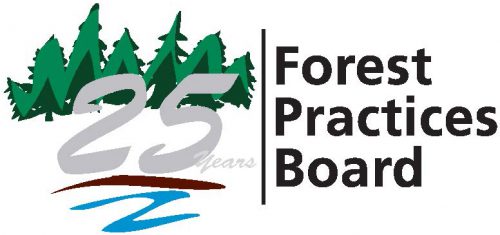
It was 25 years ago, on January 3, 1995, that the very first Forest Practices Board began its work. Part 8 of the Forest Practices Code, establishing the Board, was the first part to become law in December 1994. This timing allowed the Board to prepare for its role and duties before the rest of the Code would take effect on June 15, 1995. With little more than a piece of legislation and a three month budget allocation, the six appointed Board members began the process of establishing an office, hiring staff and setting up the Board’s programs and procedures to serve the public as the watchdog on effective forest and range practices under the new Code.
In recognition of our 25 years, we will be combing through the more than 600 reports published so far and pulling out forest practice tips and suggestions that are still relevant today. Every two weeks in 2020, we will be releasing a sound forest or range practice tip and a link to a past report that covered the issue. These tips will be shared through our social media platforms (Facebook, Twitter and LinkedIn). At the end of the year we will publish a recap of all 25 tips on our website. We hope you will watch for these posts and take the time to look at the information provided. If there is a particular report or topic you would like to see highlighted, please let us know at FPBoard@bcfpb.ca or Darlene.Oman@bcfpb.ca.
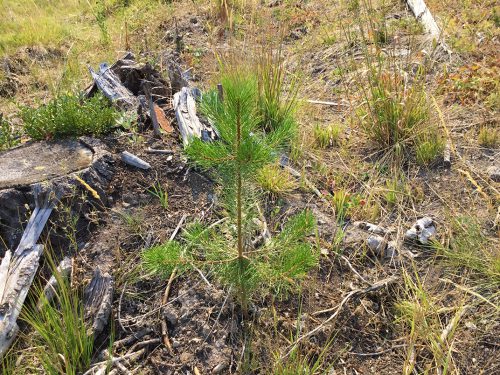
This special investigation is looking at current government guidance and licensee reforestation activities on the ground in the Interior Douglas-fir (IDF) biogeoclimatic zone. The IDF is in the Southern Interior of BC and lies in the rain shadow of the Coast, Cascade, and Columbia Mountains. Of particular concern are dry belt fir ecosystems, which are ecologically and climatically complex and require intricate silviculture strategies to ensure successful regeneration and to satisfy the wide range of values associated with these ecosystems. Investigators examined 154 cutblocks in the Cariboo-Chilcotin, Cascades, Thompson Rivers and Okanagan-Shuswap Natural Resource Districts to assess regeneration success. Field work took place in Summer 2018 and analysis of the findings has been ongoing. The report is now being finalized and we expect to publish in the first quarter of 2020.
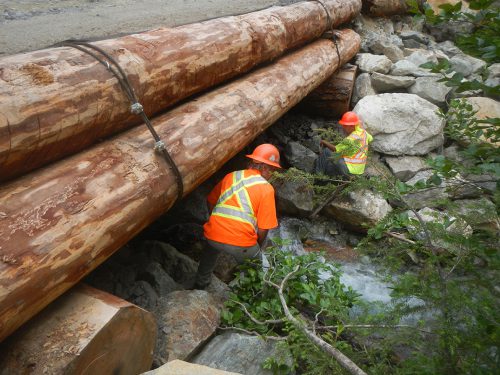 Significant progress was also made on the Bridge and Major Crossing Special Investigation this year. Staff examined 269 bridges and 59 wood box culverts in the Mackenzie, North Island, Skeena-Stikine, Sea to Sky and Selkirk Districts for compliance with FRPA. The investigation is assessing improvements to bridge construction since we first looked at the practice in 2013. The key issues being examined are safety, environmental protection and professional practice. The report should be published in the first quarter of 2020.
Significant progress was also made on the Bridge and Major Crossing Special Investigation this year. Staff examined 269 bridges and 59 wood box culverts in the Mackenzie, North Island, Skeena-Stikine, Sea to Sky and Selkirk Districts for compliance with FRPA. The investigation is assessing improvements to bridge construction since we first looked at the practice in 2013. The key issues being examined are safety, environmental protection and professional practice. The report should be published in the first quarter of 2020.
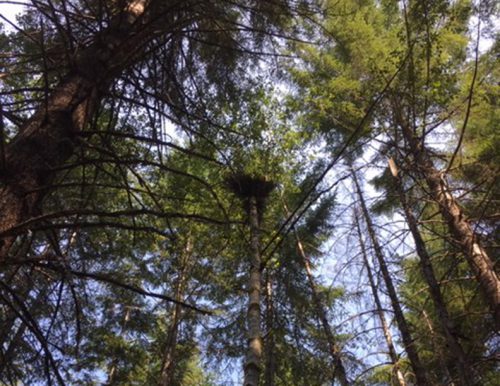 For this special investigation, the Board looked at legal requirements for coastal goshawks that are a species at risk under FRPA, and the voluntary practices for interior goshawks that are considered in peril but not listed under FRPA as a species at risk. Investigators visited more than 50 goshawk nest sites in the field and interviewed biologists, foresters and government staff as part of the assessment of how well FRPA has provided protection for this species at risk. The analysis has been completed, and the draft report is being peer reviewed in preparation of the final report for consideration by the Board.
For this special investigation, the Board looked at legal requirements for coastal goshawks that are a species at risk under FRPA, and the voluntary practices for interior goshawks that are considered in peril but not listed under FRPA as a species at risk. Investigators visited more than 50 goshawk nest sites in the field and interviewed biologists, foresters and government staff as part of the assessment of how well FRPA has provided protection for this species at risk. The analysis has been completed, and the draft report is being peer reviewed in preparation of the final report for consideration by the Board.
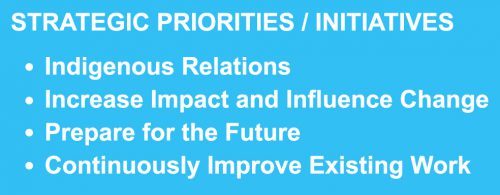 Implementation of the Board’s Strategic Plan for 2019-2022 is underway. The Board is developing a new policy on Indigenous relations and expects to have it completed by March 31, 2020. The Board intends to recognize UNDRIP and to do what it can to support reconciliation and to recognize new models of forest management and partnership that will evolve over the coming decade. Building relationships will be an important first step and this policy will lay out how we will do that within our sphere of influence.
Implementation of the Board’s Strategic Plan for 2019-2022 is underway. The Board is developing a new policy on Indigenous relations and expects to have it completed by March 31, 2020. The Board intends to recognize UNDRIP and to do what it can to support reconciliation and to recognize new models of forest management and partnership that will evolve over the coming decade. Building relationships will be an important first step and this policy will lay out how we will do that within our sphere of influence.
The Board is also considering how it can address the future priorities that will affect future forest practices – expect to see a submission to the government’s consultation on Climate Change Adaptation and another submission on Old Growth Management to the Gorley-Merkel panel in January, as well as further discussion of our report on the need for tactical planning.
We continue to reach out to stakeholders and organizations interested in our work. In 2019 we had more than
30 meetings with forest sector organizations, gave two dozen presentations on Board reports and findings, including 9 presentations to post-secondary students, and attended two dozen conferences and events. These opportunities allow us to hear from people and organizations about their concerns and to talk to them about our work. This is an important aspect of our strategic priority of Increasing Impact and Influencing Change.
We are also monitoring the changes to FRPA legislation that are underway and will continue working to ensure our recommendations and advice are considered by government as the legislation and regulations evolve over the next year.
Our small organization of 20 staff and 6 Board members accomplished a lot in 2019.
We carried out 9 new audits of forest licensees and completed and published 10 audit reports. Three of our published reports involved First Nations licensees and the Board was pleased to see that all three generally met the legal requirements for forest practices in FRPA and the Wildfire Act. One audit identified a minor improvement to locating slash piles for burning to address fire risk, while another commended the licensee for facilitating the use of slash and debris by a bioenergy company. It’s positive to see First Nations actively engaged in the forest sector.
We received 56 concerns and 9 new complaints from the public in 2019. We also completed and reported our findings on 11 complaint investigations, five of which ended up being resolved by the parties. It’s very rewarding for the Board when we are able to help the participants in a complaint work out their issues and come to a resolution that satisfies everyone involved.
Of the 11 complaint investigations completed in 2019, six involved concerns about roads or harvesting causing landslides or sedimentation and impacting water resources or fish. Other topics examined were visual quality, landscape level biodiversity conservation, mushroom resources, forest fires, and ecosystem based management in Haida Gwaii.
Four special projects were completed in 2019 – two special investigations and two special reports from the Board Chair.
The public downloaded our reports from our website over 7500 times this year.
The most downloaded reports in 2019 were:
5. 2018-19 Annual Report
4. Fire Hazard Abatement and the Shovel Lake Wildfire
3. Road Deactivation and Impacts to Fish Habitat Near Kelowna
2. Appropriateness of Government’s Compliance and Enforcement Framework for FRPA and the Wildfire Act
And the most popular report this year was:
1. Tactical Forest Planning: The Missing Link Between Strategic Planning and Operational Planning in BC
Look for the Board at the following events in early 2020:
January
February

Norma has completed her term with the Board after serving for five and a half years. During her term, Norma brought a valuable perspective based on her past experience in the mining sector and with the Outdoor Recreation Council. Norma contributed to numerous Board reports on topics of significant public interest. Highlights include access management, district manager authority, forest fuels in the wildland urban interface, the forest and range evaluation program and the appropriateness of government’s enforcement of FRPA. She was also a panel member on a number of investigations of public complaints. Norma had a knack for asking the fundamental questions that kept everyone grounded and always ensured the public was kept at the forefront during panel deliberations. Her contributions at the Board table will be missed and we thank her for her service to the Board and the public of BC.
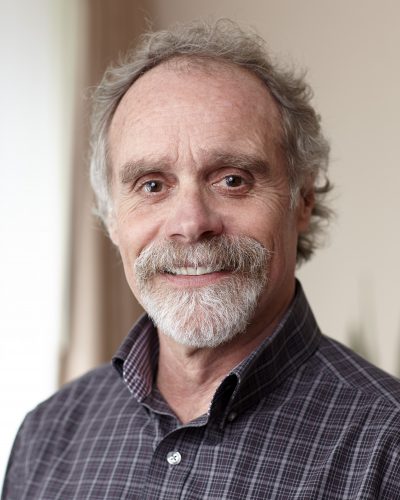 Garth will be retiring from the Board at the end of January 2020. Garth is the Board’s expert on roads and major crossings and his knowledge and experience have been invaluable. A professional engineer, Garth has been working in forestry and engineering for 35 years. He started out working in Haida Gwaii, spent some time in Port Hardy and then moved to Salmon Arm in 1997. Garth began working for the Board as a contract auditor in 1997 and later joined us as a full time audit manager in 2013. He has been the roads expert on over 80 Board audits and has personally examined well over 50 000 kilometres of forest road and 1 500 bridges in every corner of the province. During his time with the Board, he also led the Steep Roads Special Investigation and was co-lead on both Special Investigations of Bridge Construction. Garth is looking forward to camping, boating and snowboarding with his wife Debbie and spending more time with his two grandsons. Congratulations on a well-deserved retirement Garth.
Garth will be retiring from the Board at the end of January 2020. Garth is the Board’s expert on roads and major crossings and his knowledge and experience have been invaluable. A professional engineer, Garth has been working in forestry and engineering for 35 years. He started out working in Haida Gwaii, spent some time in Port Hardy and then moved to Salmon Arm in 1997. Garth began working for the Board as a contract auditor in 1997 and later joined us as a full time audit manager in 2013. He has been the roads expert on over 80 Board audits and has personally examined well over 50 000 kilometres of forest road and 1 500 bridges in every corner of the province. During his time with the Board, he also led the Steep Roads Special Investigation and was co-lead on both Special Investigations of Bridge Construction. Garth is looking forward to camping, boating and snowboarding with his wife Debbie and spending more time with his two grandsons. Congratulations on a well-deserved retirement Garth.

Sam will be leaving the Board effective January 17, 2020, to pursue other interests. Sam has been with the Board since March 2017 and has become a valued member of the staff. He has overseen some significant complaint investigations and special projects in his time with the Board. He also implemented a review and overhaul of the complaint investigation manual, shortening the process to help achieve efficiencies and modernizing the manual, which has not been updated since before FRPA was created in 2004. Sam also brought his experience working with First Nations to our organization and has done a substantial amount of outreach with First Nations across BC. He has also been a frequent presenter to forestry students at UBC, ensuring the newest generation of foresters will be very familiar with the Board and its role when they begin their careers. Sam will be missed by all of us and we wish him the best in his new adventures.
 Connor is a second year law student at UVIC who joined us for the fall co-op term, working with the Board’s legal counsel. He comes from Campbell River and has some previous forestry experience so he is really interested in the role of the Board and its work encouraging sound forest and range practices. During his term, Connor worked on summarizing determination made under FRPA and the Wildfire Act, assisting with preparatory work for an appeal before the Forest Appeals Commission, carrying out legal research on numerous law issues that arose in the Board’s audit and investigation work, along with a variety of other projects.
Connor is a second year law student at UVIC who joined us for the fall co-op term, working with the Board’s legal counsel. He comes from Campbell River and has some previous forestry experience so he is really interested in the role of the Board and its work encouraging sound forest and range practices. During his term, Connor worked on summarizing determination made under FRPA and the Wildfire Act, assisting with preparatory work for an appeal before the Forest Appeals Commission, carrying out legal research on numerous law issues that arose in the Board’s audit and investigation work, along with a variety of other projects.
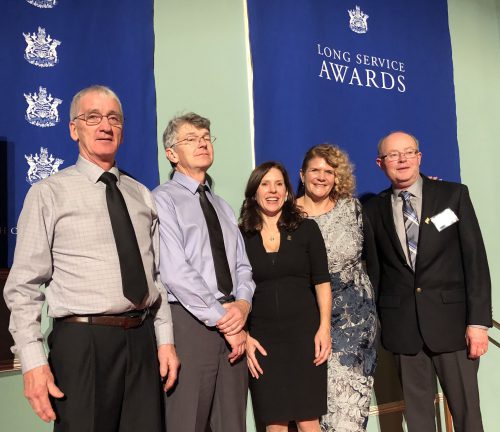
In October, five of the Board’s staff were recognized for their long service to the public of British Columbia at a ceremony at Government House in Victoria. With a total of 150 years of public service between them, the recipients were (from left to right):
